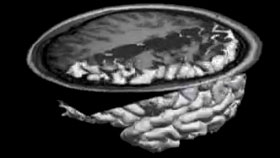Text by Antonio Damasio for Bruce Adolphe (composer) and Yo-Yo Ma (musician). For more information on Self Comes To Mind, please visit: www.thelearningmaestros.com

Brain scanner image by Hanna Damasio
I. When Mind First (in the Body Bloomed)
Mind first bloomed quietly
and no one knows when,
although we know where:
within a brain that lived within a body.
Each mind bloomed quietly,
quietly made of images
(well, brain maps actually),
images of its own body
in repose and in motion—
images of smell and taste,
of touch and sound, of sights.
But no one knew that minds existed
least of all the beings within whom
minds had now emerged.
Unannounced and undetected,
minds had entered life.
Once minds began blooming
nothing was ever the same.
But who would know
that the universe had changed?
No one. Nothing could yet be known.
II. Self Came to Mind
When knowing began
it bloomed as quietly as mind first had.
Knowing came from the very same secret—
making images—
Each mind composed a portrait of
its own organism
with images from within the body
(well, brain maps actually).
The organism moved about and sensed around
but now the mind had a protagonist —
the portrait of the organism at the center of the action —
and now the mind could tell the story
of what was happening to it.
This first story had no words, just images.
There were images of the body—they became feelings,
and there were images of things done to the body —
sound and sight and touch are things done to the body.
The images of what the body underwent
were attributed to the images of what the body was.
Mind had fashioned
a self without words,
the would be I, the would be me.
Thus self came to mind,
and when it did,
some part of the mind knew
that the rest existed.
Or so it seemed.
Ever blind, nature
had conjured up an apprentice.
The conscious mind was timid, at first,
as it noticed simple things
inside and around the body boundary.
But in humans the flourishing was
bold and intense.
What the mind did notice it could record,
and what it recorded could be recalled,
And not just the past, not just the now—
the future too, could be imagined and once imagined could be recorded.
Loss could be foreseen, but so could gain,
and so could hope.
From its simple beginnings, the conscious mind
revealed some part of existence.
But then conscious human minds banded together,
and invented languages of gesture and of music,
languages of words and of math,
and partial revelation became discovery.
Mind had stepped into the light.
Those were glory days.
III. Discovery
What conscious human minds first discovered
was that existence was drama.
Had there been no knowledge, no drama would have been.
Consciousness had revealed joy
but the price was high—
now the mind knew pain
and unattainable pleasure.
Were it not for the conscious mind,
were it not for knowing,
there would have been no bliss
and no suffering, just a mind unexamined.
But drama is not necessarily tragedy
and this is not the end of the story.
When sorrow could no longer hide
the apprentices turned against the sorcerer.
They used knowledge to transform existence
and respond defiantly to suffering.
Nature, ever blind, did not care
that a part of itself wanted to shape its future.
And still it does not.
We are allowed
to rebel against indifference.
We have a say.
Drama is not necessarily tragedy
and this is not the end of the story.
Antonio Damasio
